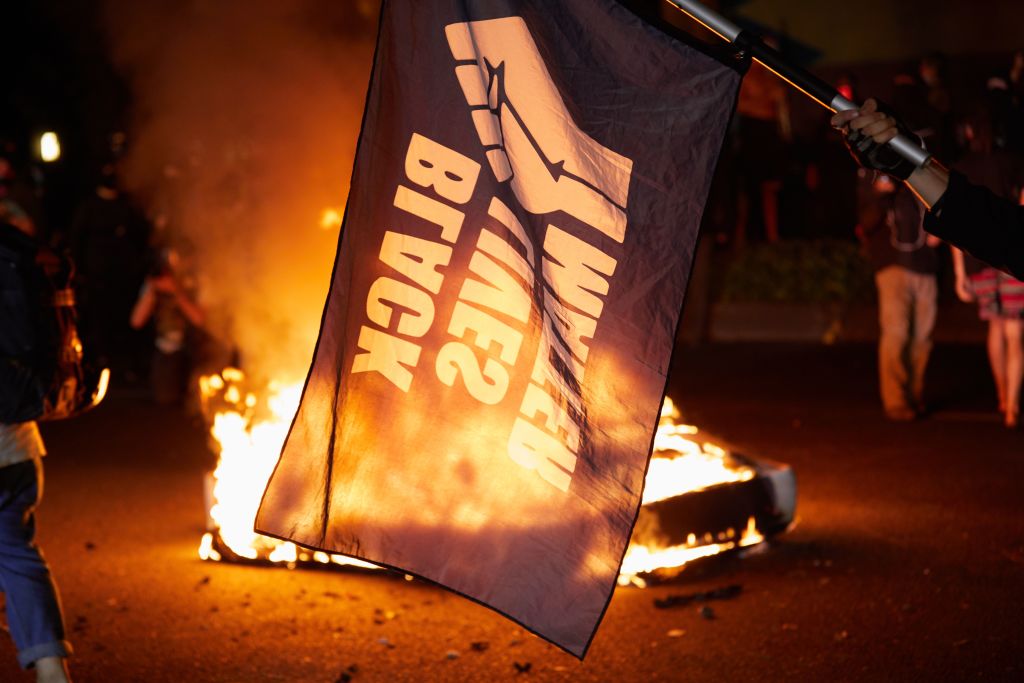One feels for the olds who birthed this cancer. They just wanted to placate the youngs. They had no idea they were disemboweling the same institutions they were charged with safeguarding against the idiot-children.
The olds, the so-called progressive elites (so-called because they lacked any sense of noblesse oblige), were scared of being ‘on the wrong side of history’. They wanted the youngs — the new radicals — to like them, to follow them on social media. They wanted to hold onto their power, and they were shallow, and they were vulnerable to their own spinelessness. Blinded by it.
The new radicals — the most vociferous of whom were rich children from big cities — were bound together by three animating forces: anti-racism, anti-Semitism and opposition to any debate about the new radicalism, hence their hostility to free expression. These three threads were not arbitrary. They were woven together, and the one could not be disentangled from the others. They comprised a Möbius strip of hate.
The anti-racism, to those who hadn’t succumbed to the newspeak, was racism. A belief in the genetic wrongness of white people. The radicals didn’t put it this way. They Christianized their hate. They turned whiteness into original sin, and they cordoned themselves off from accusations of hate by redefining it — by arguing one could only hate from the top-down: the powerful could be racist; the not-powerful could not be. Black anti-racists were simply ‘calling out’ white people’s oppression of them. White anti-racists were repenting.
The anti-Semitism was the apotheosis of the anti-racism. It cloaked itself, as it must these days, in anti-Zionism, and it was remarkable because, at first blush, it struck one as so off-topic. What did Israel have to do with George Floyd or equity or ‘white supremacy’? But it wasn’t off-topic. It was the logical outgrowth of a long and inextinguishable hate.
In times past, of course, gentiles were free to wage war against Jews. But, with the dawn of the modern in the 17th century, and the blossoming of Enlightenment in the 18th century, that sort of overt Jew-hate became unpalatable — forcing a shift, in the late 19th century, from religion to race. The problem with the Jews was not the God they prayed to or any of their depraved rituals. (Long gone were the days of accusing Hebrews of making matzoh out of the blood of Christian children.) The problem with the Jews was biological, which was a very modern way of looking at things. They were of a lesser race, and — sadly — there was nothing that could be done about that. But then — dammit — Zyklon-B, and it was no longer so easy to racialize Jews. How Nazi-ish. But then — what’s this? — Israel, which was founded in 1947 and has morphed into the rationalization for the new anti-Semitism.
Today, a good progressive doesn’t hate Jews as religious or racial inferiors but as colonizers of black people. Exponents of a latter-day apartheid. Instead of imposing his will clandestinely, in the fashion of the Elders of Zion, he oppresses openly, in an IDF uniform with his automatic rifle pointed at the head of a Palestinian. Viewed through the lens of the new radicalism, anti-Semitism is really anti-colonialism, and anti-colonialism is really anti-racism in its most distilled form. Which means it cannot be anti-Semitic, and if you say it is, you’re anti-anti-racist. Which is the worst thing anyone can be.
None of this was open for debate. The new radicalism had an intellectual sheen — critical race theory, intersectionality, left-wing identitarianism — but that was just a sheen, and it was meant to lend an unwarranted seriousness, a scholarship, to the whole project. There were intriguing aspects of that scholarship but the new radicalism was hardly confined to the campus. It had penetrated, to varying degrees, most major, American institutions, including the Democratic party, the federal and state bureaucracies, legacy media, Hollywood, Silicon Valley and hundreds of seemingly old-fashioned multinationals, and it had congealed into a set of religious beliefs — a dogma.
This dogma was not a philosophical debate or camp or school of thought. It was corporatized groupthink, and it had its own vernacular and ritual, and it revolved around a handful of core convictions. Those included the assumption that systemic racism was ubiquitous, and that it had been sustained by a uniquely nefarious ‘whiteness’, and that it did not matter how correct or moral any particular white person might be, because all white people benefited from the same racist system they claimed to oppose but did not really want to dismantle.
The defenders of The Truth must have intuited that dogma cannot persist indefinitely. It is under constant scrutiny. This is true even in relatively unfree societies and especially true in a country like the United States. To limit that scrutiny, The Awokened told us that the scrutinizers were racist, and they repeated this, with greater frequency and at deafening volumes, on their social media feeds. What else could these heretics be? Certainly, one could not be an adherent of the faith while questioning, let alone rejecting, any of the central tenets of that faith. Those who questioned the charges of racism leveled against the questioners were told that free expression was a white privilege, something that only beneficiaries of systemic racism could afford to care about. They were told that they, too, were racist.
Soon, nobody wanted to be associated with the questioners, or the questioners of the critics of the questioners. Soon, nobody wanted to say or post anything that could be viewed as racist or racist-adjacent or just insufficiently anti-racist: how can we really know what millions of people think about other people’s skin color? Are differing outcomes necessarily evidence of systemic racism? The discourse melted into a stark, boring canvas of good and evil. Nuance was racist. Everything outside the parameters of the new radicalism was racist. Few stepped outside those parameters. That would be bad for one’s brand.
This is how this multi-faceted hate — a hatred of liberalism, pluralism, capitalism, knowledge, art, innovation — sustained and sustains itself. It’s been curdling around the university green for years, but now it has metastasized across spaces and markets, the big cities and corner offices and inner sanctums of what was once called the Establishment.
The olds, clinging to power, lack the courage and fortitude of previous guardian classes to push back. It’s not just that they fear the youngs. They don’t know who they are supposed to be, or what their role is, or what it is not. One senses that they are untethered from the past and that they believe themselves to be under no obligation to the future. They fret about their networks. They lack the stodginess and reserve one wishes they had. They are crass, and their crassness makes them small and ineffectual and mean.
A final thought: The Awokened rarely, if ever, defend the particulars of their crimes against decency and fairness. They socialize them. They portray their mobs and slanders as necessary salvos in a historical struggle against injustice. They do this because it’s impossible to justify discriminating against anyone on the basis of their immutable traits, and they know it, and everyone who stays silent knows it. And they do this because they are radicals. Nihilists. They mean to destroy.
The olds, the people whose job was to make sure this inanity never came to pass, are useless. What is needed are new olds, fortysomethings, fiftysomething, Gen-Xers, people who remember analogue — new stodgy, crusty, cranky people imbued with wisdom and perspective, those who came before, those who are not good at Twitter, those who have no idea what it means to signal or ‘read the room’, who will say what must be said, which is, ‘That’s enough — that’s not how we do things.’
This article was originally published on Medium.


















